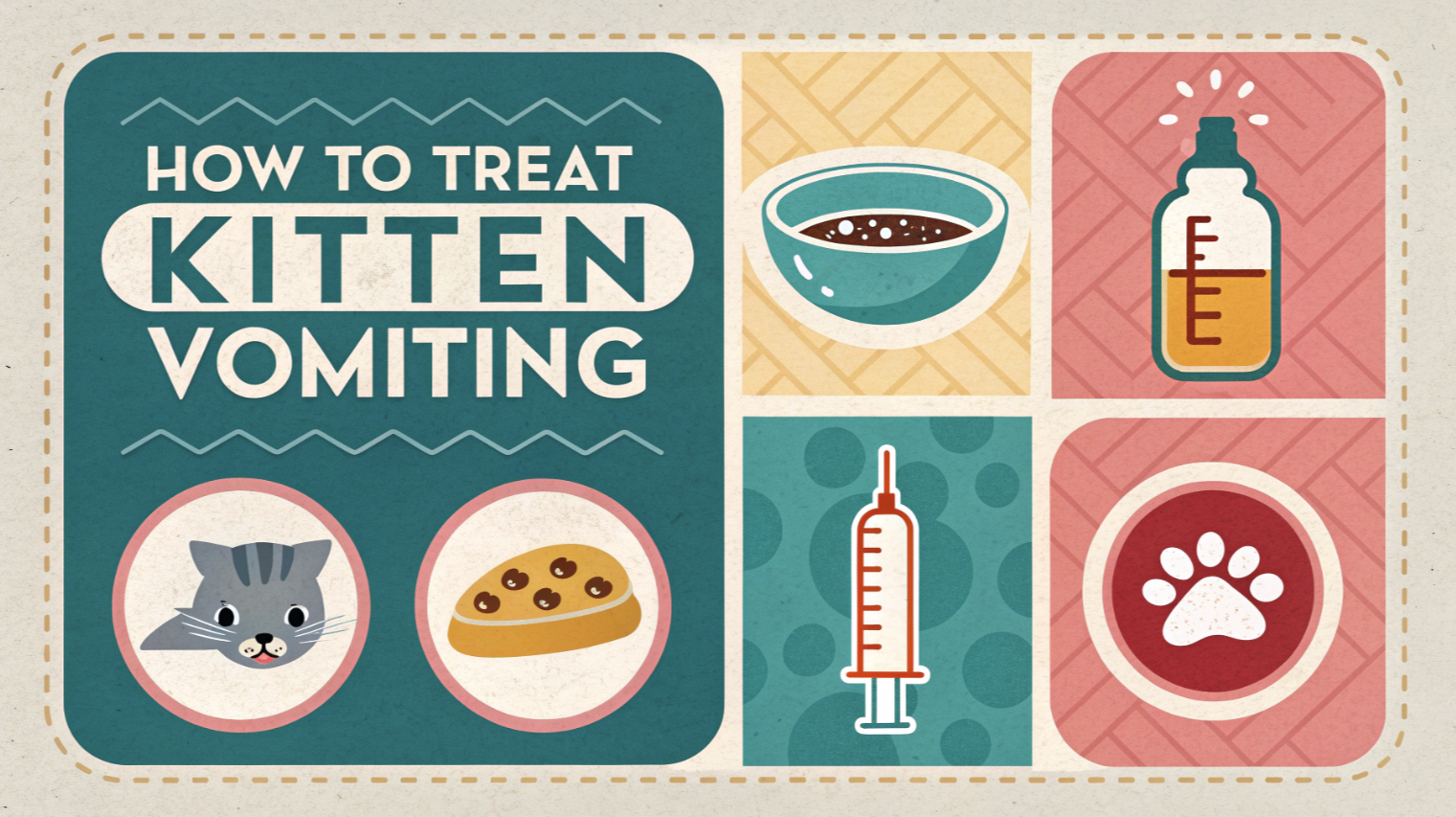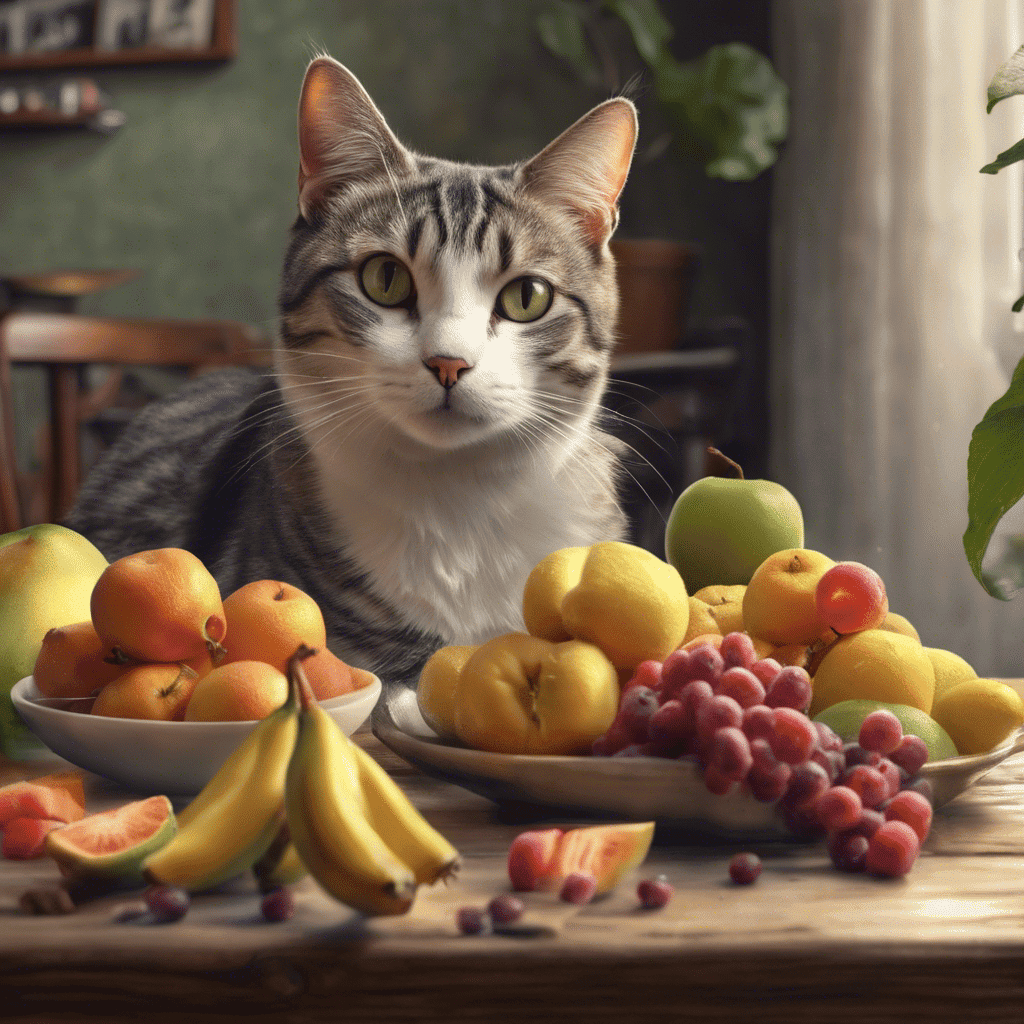
When your kitten vomits, act quickly. Remove their food briefly to let their stomach settle. Monitor vomiting frequency—8–10 times in one day may indicate a serious problem. Keep your kitten hydrated and check for dryness in their gums or perform a skin turgor test to assess dehydration.
Recognizing symptoms like lethargy, dry mucous membranes, or sunken eyes is crucial. While mild cases of cat vomiting often improve with at-home care, persistent symptoms require immediate veterinary attention. This article will show you how to treat kitten vomiting to ensure a faster recovery.
Common Causes of Cat Vomiting
Dietary Issues
Dietary problems are one of the most common reasons for vomiting in kittens. Eating too quickly often leads to regurgitation, where undigested food returns to the mouth shortly after meals. Food allergies also play a significant role. Ingredients like beef, fish, and chicken can trigger adverse reactions in sensitive kittens, causing cat vomiting episodes.
Up to 25% of vomiting cases in cats are linked to dietary issues, including food intolerances and poor eating habits.
To minimize these risks, monitor your kitten’s eating speed and consider switching to hypoallergenic food if allergies are suspected.
Hairballs or Foreign Objects
Kittens frequently groom themselves, which can lead to hairball formation. While occasional hairballs are normal, frequent vomiting due to hairballs may indicate a more serious issue. Ingesting foreign objects like elastic bands or small toys can also cause blockages in the digestive tract.
Studies show that 99 out of 100 cats with frequent vomiting had underlying conditions, such as Inflammatory Bowel Disease or cancer. If your kitten vomits repeatedly or shows signs of distress, seek veterinary care immediately.
Prompt intervention ensures high survival rates for cases involving foreign body ingestion.
Parasites or Infections
Parasites are a common cause of vomiting, especially in young kittens. Roundworms and other intestinal parasites disrupt digestion and lead to gastrointestinal upset. Infections, whether viral, bacterial, or fungal, can also trigger vomiting. Chronic conditions like Inflammatory Bowel Disease (IBD) or systemic diseases such as diabetes and hyperthyroidism may contribute to persistent symptoms.
Regular deworming and vaccinations reduce the risk of parasites and infections, keeping your kitten healthy and happy.
Stress or Environmental Changes
Stress impacts kittens more than you might expect. Sudden changes in their environment, such as moving to a new home or altering their routine, can lead to vomiting. Research published in the Journal of the American Veterinary Medical Association highlights the direct link between stress and gastrointestinal symptoms in cats. Reducing stressors, like loud noises or unfamiliar surroundings, often improves symptoms.
Providing a calm and stable environment helps your kitten feel secure and reduces the likelihood of stress-induced vomiting.
How to Treat Kitten Vomiting at Home
Withhold Food Temporarily
When your kitten starts vomiting, giving their digestive system a break can help. Withholding food for a short period—usually 12 to 24 hours—allows their stomach to settle. This approach is particularly effective for acute vomiting that occurs without other severe symptoms.
However, avoid fasting for longer than 24 hours, as kittens have high metabolic needs. Extended fasting can lead to serious complications like fatty liver disease.
|
Recommendation |
Time Frame |
Details |
|---|---|---|
|
Withhold food |
12-24 hours |
Helps the digestive system recover from acute vomiting. |
|
Introduce bland diet |
After 24 hours |
Feed small, frequent meals to support digestion and prevent further issues. |
If your kitten continues vomiting during this period, consult a veterinarian immediately. Persistent symptoms may indicate an underlying issue that requires professional care.
Tip: Always ensure your kitten has access to fresh water, even when withholding food. Dehydration can worsen their condition.
Ensure Hydration
Vomiting can quickly dehydrate kittens, especially if they are very young. You can check for dehydration by gently pinching the skin between their shoulder blades. If the skin doesn’t snap back immediately, your kitten may need fluids.
Kittens under two weeks old require about 180 ml of fluids per kilogram of body weight daily, while older kittens need slightly less.
Here are some ways to keep your kitten hydrated:
-
Offer fresh, clean water at all times.
-
Use a syringe or dropper to provide small amounts of water if they’re reluctant to drink.
-
Consider an electrolyte solution designed for pets to replenish lost nutrients.
If your kitten shows signs of severe dehydration, such as sunken eyes or dry gums, seek veterinary care. Intravenous fluids may be necessary to restore their hydration levels.
Reintroduce a Bland Diet
Once your kitten has gone 12-24 hours without vomiting, you can start reintroducing food. Begin with a bland diet that’s easy on their stomach. Boiled chicken or turkey (without seasoning) and plain white rice are excellent options.
Feed small portions—about a teaspoon—every 3-4 hours. Gradually increase the portion size over the next few days as their condition improves.
Continue this bland diet for 3-7 days before transitioning back to their regular kitten food. Make the switch gradually by mixing the bland food with their usual diet to prevent further digestive upset.
Monitor for Improvement
Keep a close eye on your kitten’s behavior and symptoms during recovery. Look for signs of improvement, such as increased energy, normal appetite, and the absence of vomiting. If your kitten vomits again after reintroducing food, return to the bland diet and consult your veterinarian.
Use a journal to track their progress. Record details like the frequency of vomiting, the type of food given, and any changes in behavior. This information can help your vet identify potential triggers or underlying conditions if the vomiting persists.
When to Seek Veterinary Help
Knowing when to seek veterinary help is crucial for your kitten’s health. While mild cases of vomiting can often be managed at home, certain symptoms indicate the need for immediate professional care.
Acting quickly can make a significant difference in your kitten’s recovery.
Persistent Vomiting
If your kitten continues vomiting despite your efforts, it may signal a more serious issue. Chronic vomiting, defined as vomiting three or more times per month for at least three months, requires veterinary attention.
Persistent vomiting can lead to dehydration, nutrient deficiencies, and weight loss, which are especially dangerous for young kittens.
|
Criteria for Veterinary Attention |
Description |
|---|---|
|
Signalment and history |
A detailed history and clinical findings are essential for diagnosing vomiting. |
|
Triage for acute vomiting |
Immediate stabilization measures should be assessed for acute vomiting cases. |
|
Chronic vomiting definition |
Vomiting three or more times per month for at least three months. |
It’s also important to differentiate vomiting from regurgitation. Vomiting involves active heaving and is often preceded by nausea, while regurgitation occurs passively. If you notice repeated episodes of vomiting, consult your veterinarian promptly.
Blood in Vomit
Blood in your kitten’s vomit is a red flag that requires urgent veterinary care. This could indicate internal bleeding, ulcers, or ingestion of a sharp object. Blood may appear as bright red streaks or resemble coffee grounds, depending on the source.
Common causes of blood in vomit include:
-
Gastrointestinal ulcers
-
Ingestion of foreign objects
-
Severe infections or parasites
If you notice blood, avoid attempting home remedies. Transport your kitten to the vet immediately for a thorough examination and treatment.
Severe Symptoms or Dehydration
Severe symptoms, such as extreme lethargy, sunken eyes, or dry gums, often accompany dehydration. Kittens are particularly vulnerable due to their high surface-to-volume ratio and immature renal concentrating abilities.
Vomiting and diarrhea can quickly deplete their fluid reserves, making immediate medical intervention necessary.
Signs of severe dehydration include:
-
Skin that doesn’t snap back when pinched
-
Dry or sticky gums
-
Rapid breathing or a weak pulse
Kittens require more fluids than adult cats to maintain hydration. If your kitten shows these symptoms, your vet may administer intravenous fluids to stabilize their condition.
Suspected Poisoning
If you suspect your kitten has ingested a toxic substance, seek veterinary help without delay. Time is critical in poisoning cases, and early intervention can save your kitten’s life. Common signs of poisoning include:
-
Excessive drooling
-
Vomiting shortly after ingestion
-
Weakness or lethargy
-
Respiratory distress
The ASPCA’s Animal Poison Control Center reports over 100,000 emergency calls annually regarding feline poisonings. Substances like household cleaners, certain plants, and human medications are common culprits.
If you suspect poisoning, avoid inducing vomiting unless instructed by a veterinarian. Instead, transport your kitten to the nearest animal hospital immediately.
Taking quick action when your kitten vomits ensures a faster recovery. Regular care, including monitoring their diet and hydration, helps prevent future issues. Create a safe environment to reduce stress and avoid harmful substances. Following these steps helps your kitten regain health and thrive. 🐾
Prevention and attention are key to keeping your furry friend happy!
FAQ
What should you do if your kitten refuses to drink water?
Encourage hydration by offering water in a shallow dish, using a syringe for small sips, or providing a pet-safe electrolyte solution. Consult your vet if dehydration persists.
Can stress cause vomiting in kittens?
Yes, stress can trigger vomiting. Environmental changes, loud noises, or new routines often upset kittens. Create a calm, stable environment to reduce stress-related symptoms.
Is it safe to give over-the-counter medications to a vomiting kitten?
No, avoid giving human medications to kittens. Many are toxic to cats. Always consult your veterinarian before administering any treatment.

In her previous life, Lisa traveled extensively, both for work and leisure. After the pandemic struck, Lisa locked up her luggage and adopted a cat ever since.
Lisa is now an avid cat lover, she devotes most of her free time serving as butler to her adorable feline at home. When she is not with her cat, she can be seen using her phone sourcing for the latest cat supplies online.


